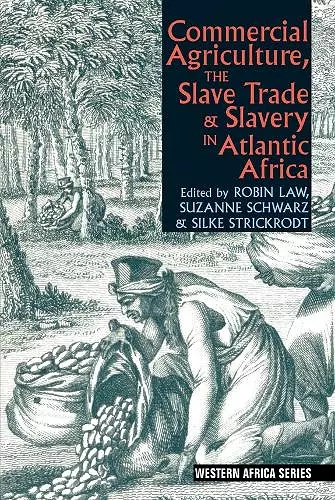Commercial Agriculture, the Slave Trade & Slavery in Atlantic Africa
Suzanne Schwarz editor Robin Law editor Silke Strickrodt editor
Format:Hardback
Publisher:James Currey
Published:17th Oct '13
Currently unavailable, and unfortunately no date known when it will be back

Re-envisages what we know about African political economies through its examination of one of the key questions in colonial and African history, that of commercial agriculture and its relationship to slavery. This book considers commercial agriculture in Africa in relation to the trans-Atlantic slave trade and the institution of slavery within Africa itself, from the beginnings of European maritime trade in the fifteenth century to theearly stages of colonial rule in the twentieth century. From the outset, the export of agricultural produce from Africa represented a potential alternative to the slave trade: although the predominant trend was to transport enslaved Africans to the Americas to cultivate crops, there was recurrent interest in the possibility of establishing plantations in Africa to produce such crops, or to purchase them from independent African producers. Thisidea gained greater currency in the context of the movement for the abolition of the slave trade from the late eighteenth century onwards, when the promotion of commercial agriculture in Africa was seen as a means of suppressing the slave trade. At the same time, the slave trade itself stimulated commercial agriculture in Africa, to supply provisions for slave-ships in the Middle Passage. Commercial agriculture was also linked to slavery within Africa, since slaves were widely employed there in agricultural production. Although Abolitionists hoped that production of export crops in Africa would be based on free labour, in practice it often employed enslaved labour, so that slaveryin Africa persisted into the colonial period. Robin Law is Emeritus Professor of African History, University of Stirling; Suzanne Schwarz is Professor of History, University of Worcester; Silke Strickrodt is Visiting Research Fellow at the Department of African Studies and Anthropology, University of Birmingham.
The ideas put forward in this volume open a new set of research questions in African History and will inspire further comparative analyses across time and space. * HISTORIA AGRARIA *
[T]his volume is the new and best gateway for students, non-Africanist historians, and specialists alike into the scholarly history of this subfield, its emergent (and enduring) debates, and state-of-the-art case studies that stimulate new theorizing. * INT'L JOURNAL OF AFRICAN HISTORICAL STUDIES *
[These essays] add much information about the African economies from the seventeenth to the nineteenth centuries, as well as provide new insights into the Atlantic Economy in these years. This is an important collection of first-rate essays. * EH.NET *
'[Looks]... at one of the most perplexing questions in world history: as so many of the crops which were cultivated in the Americas by African slave labour were grown or could be grown in Africa, why were the costs and the horrors of the Middle Passage undertaken? ... It is a problematic that demands a serious discussion of what we know about African political economies in the last half of the last millennium AND a real command of the intentions and understandings of the 'merchants trading into Africa'...This will prove, at least I hope it will prove, to be a much-discussed book. It is a fine collection and it is a major collection.' - Professor Richard Rathbone, Emeritus Professor and Professorial Research Associate, * SOAS *
'Though many books deal with the so-called transition in West Africa from slave trading to legitimate trade, none has such a valuable, direct focus on the role of commercial agriculture in the process. One learns an enormous amount about slavery, slave-trading, the Atlantic slave trade, and the movement to abolish slave trading and slavery from reading this book. This book is of critical importance to each of these topics or sub-fields.' - -- Professor Donald Wright, Distinguished Teaching Professor of History, State University of New York
ISBN: 9781847010759
Dimensions: unknown
Weight: 634g
288 pages